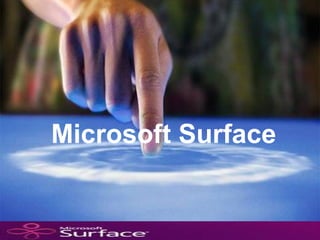Microsoft surface
- 2. What is Microsoft Surface? Microsoft Surface: • A surface computing platform from Microsoft • Tabletop Computer. You won't believe this until you see it. • It's actually real. • No mouse, no keyboards, but you can touch it and guess what . . . it actually feels you. • Don't you know what is it? It's Microsoft Surface!!!
- 3. Origin of Microsoft Surface • Idea for Surface was initially conceptualized in 2001 • Project announced on May 30, 2007 at The Wall Street’s 'D: All Things Digital' conference i.e. D5 conference • Preliminary launched on April 17,2008
- 4. H/W And S/W Specifications • A 360-degree horizontal user Touch interface • A 30-inch tabletop display • Intel Core 2 Duo @ 2.13 GHz • 2GB DDR2 RAM • 256GB SATA Hard Drive • Window Vista Operating System • Interior frame is powder- coated steel • Inbuilt Bluetooth, Infrared,Eithernet
- 5. Key elements of surface computing A form of computing that offers “a natural way of interacting with information,” rather than traditional user interface: • Direct Interaction: The ability to "grab" digital information with hands - interacting with touch/gesture, not with a mouse or keyboard. • Multi–Touch: The ability to recognize multiple points of contact at the same time, not just one (Ex. one finger, like with most touch screens), but dozens.
- 6. Key elements of surface computing • Multi–User: The Surface’s screen is horizontal, allowing many people to come together around it and experience a “collaborative , face–to–face computing experience”. • Object Recognition: Physical objects can be placed on the Surface’s screen to “trigger different types of digital responses” (Ex. cell phones, cameras, & glasses of wine).
- 7. Features of Microsoft Surface • Wireless- Transfer pictures from camera to Surface and cell phone. “Drag and drop virtual content to physical objects.” • Digital interactive painting • At a phone store • At a restaurant • Play games and use the Internet. • Watch television • Jukebox! Browse music, make play lists. •Billboard for advertising • Maps
- 8. Power of Microsoft Surface • In a restaurant if a beer mug is placed on the surface, the menu related to Beer appears on the surface. The user need to just select the item and the order automatically reaches the bartender. That is the power of Microsoft Surface. • One can draw four lines with four fingers on a Microsoft Surface. •You may go to a shop to pick up a wrist watch and liked several models. You do not know how to compare the two models, apart from the visual looks. Just place the two models on the Microsoft Surface. The power of Microsoft Surface brings out the comparison of the two models- feature by feature.
- 9. Working of Microsoft Surface • The Surface is not a touch- sensitive screen device… • The Surface uses multiple infrared cameras beneath the screen to sense objects, physical touch, etc. • This information is processed and displayed using “Rear Projection”. •No mouse or keyboard used. (1) Screen Diffuser : ”Multitouch" screen. Can process multiple inputs and recognize objects by their shapes or coded "domino" tags.
- 10. Working of Microsoft Surface contd.. (2) Infrared: The ”Machine Vision" is aimed at the screen. Once an object touches the tabletop ; the light reflects back and is picked up by infrared cameras. (3) CPU: Uses similar components as current desktop computers, Core 2 Duo processor, 2GB of RAM and a 256MB graphics card. Wireless communication,WiFi and Bluetooth antennas Operating system, modified version of Microsoft Vista. (4) Projector: Uses a DLP light engine (rear-projection HDTV's).
- 11. Who’ s using the Surface today? • Currently only commercially available and being used in the retail, hospitality, automotive, banking and healthcare industries. • Current customers are AT&T, T-Mobile, the Rio All Suite Hotel & Casino in Las Vegas, Sheraton Hotels, Disney Innovations House in California, Hotel 1000 in Seattle, Harrah’s Entertainment, and Starwood Hotels and Resorts Worldwide.
- 12. Microsoft Surface’ s Future… • Surface will continue to be sold to and used by restaurants, retail, leisure and public entertainment venues. • As of March 2009, Microsoft had 120 partners in 11 countries that are developing applications for Surface's interface. •Another business that plans to use the Microsoft Surface computers is IGT, the gaming technology company.
- 13. Microsoft Surface Benefits •Large surface area to view different windows and applications •Multi-user •Data manipulation – selecting •Moving,rotating,resizing is quick and easier •Multitouch (max. 52 points of touch)
- 14. Microsoft Surface Problems • $$$$$$$ Surface machines cost between $5,000 and $10,000. •Not portable •Poor accuracy as fat fingers are not as accurate as mouse or stylus •Objects need to be tagged (domino tags)
- 15. Conclusion •Microsoft surface is the future of computers •Fundamentally changes the way we interacts with technology •Surface takes existing technology and presents it in a new way •Its not just a touch screen but more of a touch -grab-move-slide-resize-and-place- objects-on-top-of-the-screen • So it opens up new possibilities that weren’t there before
- 16. “ A COMPUTER ON EVERY DESKTOP “ NOW WE SAY “ EVERY DESKTOP WILL BE A COMPUTER” THANK YOU…….
















